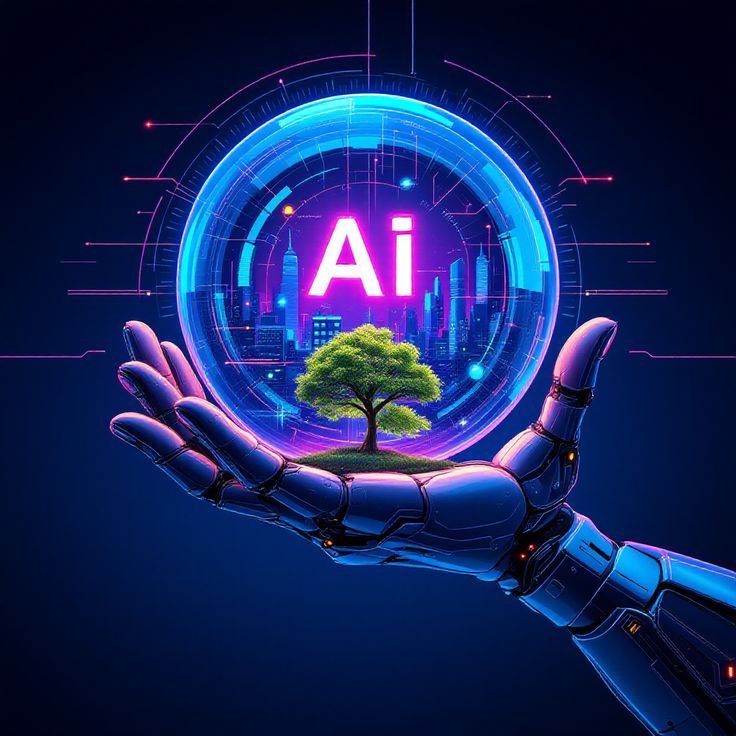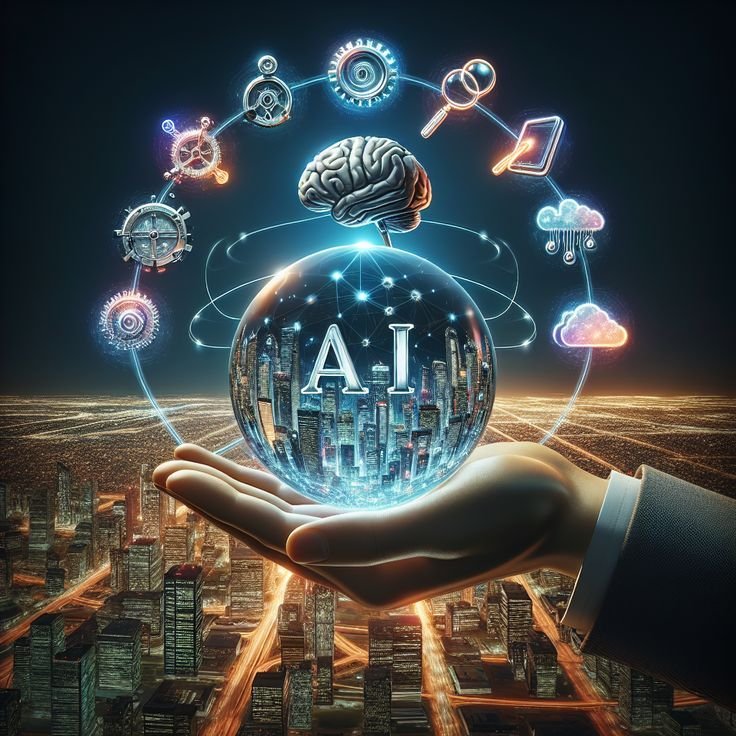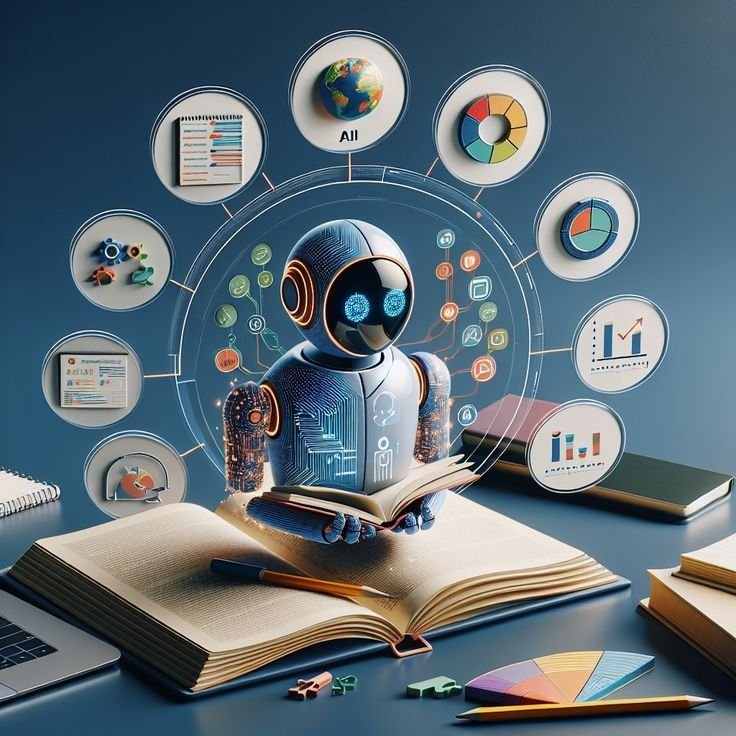🌍 Prologue: The Birth of a New Mind
Imagine this:
It’s late at night in a quiet laboratory. A group of scientists huddle around glowing computer screens. With a few lines of code, they breathe “life” into something invisible. It cannot feel, but it can recognize. It cannot dream, but it can calculate. This is the moment Artificial Intelligence (AI) begins to whisper into the human story.
From that night decades ago to today’s world of self-driving cars, smart assistants, and creative chatbots, AI has grown into a force shaping industries, societies, and even our imagination of the future.
This isn’t just technology. It’s the closest humanity has ever come to building a new kind of intelligence.
🧠 Chapter 1: What Exactly Is AI?
Artificial Intelligence is simply the ability of machines to mimic human intelligence — learning, reasoning, and problem-solving. But let’s break it down into a relatable picture.
Think of a human child:
- At first, they observe.
- Then, they imitate.
- Later, they apply logic.
AI is no different. It learns from data instead of toys, recognizes patterns instead of faces in the crowd, and makes predictions instead of guesses.
Types of AI:
- Narrow AI – Focused intelligence (like a chess app).
- General AI – Human-like intelligence across tasks (still theoretical).
- Super AI – Beyond human intelligence (the sci-fi dream—or nightmare).
📊 Chapter 2: Machine Learning – The Brain Behind AI
Machine Learning (ML) is the engine room of AI. Instead of programmers writing every rule, machines teach themselves from examples.
Three Ways ML Learns:
- Supervised Learning: Like a teacher guiding a student with correct answers.
- Unsupervised Learning: Like exploring a city with no map, finding patterns on your own.
- Reinforcement Learning: Like a dog learning tricks through rewards and corrections.

🚀 Chapter 3: Where We See AI Every Day
You don’t need to step into a lab to see AI. It’s already living quietly in your pocket, car, and even your Netflix account.
- Healthcare 🏥 → Detecting diseases, suggesting treatments.
- Finance 💰 → Fraud detection, algorithmic trading.
- Transport 🚗 → Self-driving vehicles, smart logistics.
- Education 🎓 → Personalized learning apps.
- Entertainment 🎬 → Music recommendations, AI art & deepfakes.
AI is like electricity: once invisible, now powering everything.
🔍 Chapter 4: The Human Side of AI
Behind the code are human stories:
- A doctor using AI to save lives.
- A farmer using AI-powered drones to monitor crops.
- A student using AI to learn math concepts.
But there’s also the fear:
- Workers replaced by automation.
- Privacy lost to data-hungry algorithms.
- Bias creeping into systems that judge humans.
AI is not just technology. It’s a mirror reflecting human choices.
⚖️ Chapter 5: The Ethics Maze
Here’s where it gets tricky. Imagine a self-driving car faces a sudden accident. Who should it save — the passenger or the pedestrian?
AI forces us to ask moral questions we’ve never faced with machines before:
- Should algorithms decide justice?
- How do we prevent AI from inheriting human bias?
- Do we need global rules for AI’s power?
Governments and tech companies are already building AI ethics frameworks, but the debate has only just begun.

🔮 Chapter 6: The Future That Waits
The future of AI is not just robots walking beside us. It’s more subtle — and more powerful.
- Quantum AI → Combining quantum computing with AI for mind-bending processing speed.
- AI in Creativity → Writing music, painting art, co-authoring books.
- AI Companions → Chatbots that evolve into friends or therapists.
- AI in Governance → Assisting governments with data-driven policymaking.
By 2050, AI may not just work with us — it may become part of us, embedded into our biology through brain-computer interfaces.
🧩 Chapter 7: The Balance Between Man & Machine
Will AI replace humans? The better question:
👉 Will humans learn to work with AI instead of against it?
History shows every big invention — from electricity to the internet — caused fear, but also created new opportunities. AI is no different. The key is balance:
- Use AI to automate repetitive work.
- Keep humans in charge of critical decisions.
- Ensure fairness, transparency, and responsibility.
📖 Chapter 8: Storytelling with AI
Let’s step out of facts for a moment. Imagine a short story of the future:
In 2045, a teacher walks into her classroom. But instead of chalk and a blackboard, she is greeted by an AI hologram that adapts lessons to each child’s mind. Outside, a farmer talks to his AI drone, asking how his crops are doing. Meanwhile, an elderly man speaks to his AI companion, who reminds him of his medicine and also tells him stories when he feels lonely.
This is not science fiction. These are scenarios being built right now.
🌎 Chapter 9: Global Impact of AI
Different countries are racing ahead:
- USA: Big tech companies (Google, Microsoft, OpenAI).
- China: Massive AI adoption in surveillance and fintech.
- Europe: Strict regulations focusing on AI ethics.
- Africa & Asia: AI in agriculture, mobile banking, and education.
AI is not just a Western invention — it’s becoming a global movement.

🏆 Chapter 10: The Human Responsibility
AI doesn’t have morals. It doesn’t know right from wrong. It only knows patterns in data.
That means the future of AI depends on us — humans.
- Will we use it to heal or harm?
- Will it unite or divide societies?
- Will it make us more human, or less?
🎯 Conclusion: The Digital Partner in Our Story
Artificial Intelligence is not a monster to fear, nor a magic wand to worship. It is a tool, a partner, and a mirror.
The next chapter of human history will not be humans vs machines, but humans with machines. If we use AI with wisdom, compassion, and responsibility, it will not just change the world — it will help us become better versions of ourselves.